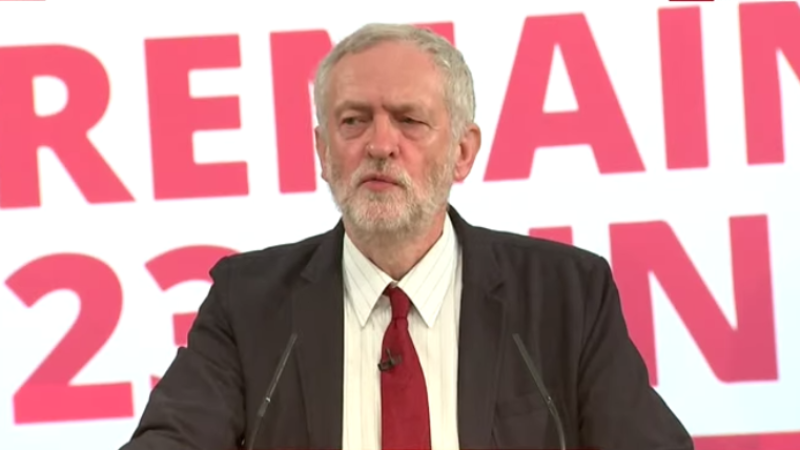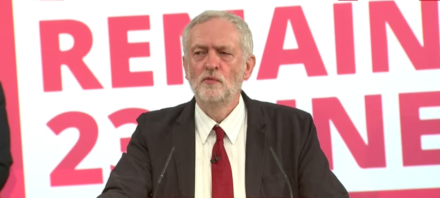

Following the vote in June 23, Labour faced two choices: embrace Brexit or rally Remainers. We may now know which has won out.
Jeremy Corbyn’s initial instinct was clear – but the decision to call for what appeared to be an immediate triggering of Article 50 the morning after the vote came far too soon for many in the party still coming to terms with the referendum result. It also raised suspicions about the Labour leader’s true attitude towards the European Union.
Unsurprisingly, Corbyn rowed back a little on this during the summer’s leadership contest, denying that he had intended to imply such a sudden departure from the EU. Yet at no point did he edge towards Owen Smith’s position, which was, in essence, to try and stop Brexit happening.
Smith’s thinking on the topic is prevalent within Labour. There is usually a boost, the logic goes, for the political party which continues to champion the cause of the losing side in a referendum – especially in a vote as close as the one this June.
The most obvious example of this is the SNP’s recent success – and Labour’s corresponding decline – following the Scottish independence referendum. Ahead of the general election last year, I wrote of Scotland: “In a two-option referendum, 45 per cent is a resounding defeat. In proportional representation, it’s a very good victory. In a First Past the Post multi-party election, it’s a landslide.”
That much is clear, and the logical extension of the argument is obvious: the 48 per cent Remain vote is surely potential for an even bigger landslide.
But there, greater problems occur. The only other receptacles for independence supporters in Scotland were the Greens and the, er, Scottish Socialist Party. Neither saw a particularly notable boost in fortune. As a vehicle for independence, the SNP had already set themselves up as the only show in town, and their able leadership, through Alex Salmond and Nicola Sturgeon, had positioned themselves not just as the leaders of the party but of the independence movement itself.
Labour would struggle to market itself as a corresponding party of the pro-EU movement. Corbyn’s reluctance to share a platform with other parties, not to mention his apparent ambivalence towards the EU as an institution, meant that we were not the main drivers of the Stronger In campaign. For large parts of the campaign, in fact, we were fairly absent. During the campaign, it was the Tories who seemed to figurehead the arguments for staying in.
Neither were we to be the only pro-EU show in town following the Conservatives’ plunge into hard Brexit territory; aside from the Tories, both the SNP and a revitalised Liberal Democrats can make serious dents in that 48 per cent.
After that, factor in the damage it would cause in Labour’s heartlands. In the North, Midlands and Wales, the Leave vote was strong, and UKIP is still making serious inroads into Labour’s base. Yesterday’s release of focus group conversations with ex-Labour UKIP supporters in north Manchester led former Ed Miliband pollster James Morris to conclude that “there is no floor under the Labour vote”. Taking our core vote for granted is not an option; it is hollow.
It is in this light that we should consider John McDonnell’s speech yesterday, which revealed a marked change in tone from previous pronouncements. The Shadow Chancellor championed a “people’s Brexit”, and co-opted the language of Vote Leave by pledging to “take back the economic levers of power currently in the hands of the EU”. He warned against the UK becoming an outer European tax haven, and began laying the foundations for building socialism outside of the EU.
It is the biggest sign yet that, after a period of reflecting on the options ahead, the Labour leadership has decided to fully commit to one side of the debate. Previous comments from Corbyn’s spokesperson putting the party’s support for the Single Market in doubt have been vague, reticent and slightly curmudgeonly. McDonnell’s speech was different. It told us that Labour is going to take Brexit as an opportunity, and that the question in future will not be “How do we stop Brexit?” but “How do we make Brexit work?” From Corbyn’s spring spent making the “Labour case for staying in”, we will now hear more about what a “people’s Brexit” will look like.
It will not go down well with many in the Labour Party, but the politics of the situation could leave us with little other choice.




More from LabourList
SPONSORED: ‘Industrial hemp and the challenge of turning Labour’s priorities into practice’
‘A day is a long time in politics, so we need ‘action this day’’
Strong support for child social media ban among Labour members, poll reveals